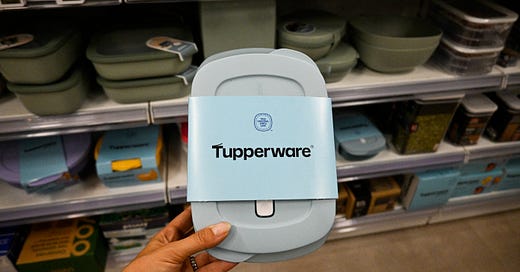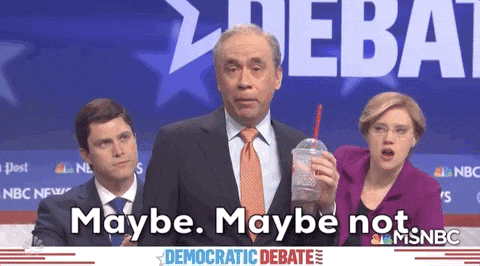💥Worse for the (Tupper)Ware💥
The Tupperware debtors and an ad hoc group of lenders duke out chapter 11.
We know what you’re thinking.
Yes, today is only Tuesday. And, yes, we normally publish on Wednesdays.
But we just couldn’t contain our excitement (see what we did there, 😉).
You’ll (hopefully) remember our initial coverage of the Tupperware Brands Corp. chapter 11 cases…*
… that there is an ad hoc group of secured lenders featuring Stonehill Institutional Partners LP, Alden Global Capital LLC, and Bank of America NA ($BAC) and they’re, like, kinda sorta pissed off. Read: vehemently against the Tupperware debtors’ chapter 11 cases. So much so that the ad hoc group saw the bankruptcy filings, rang their lawyers, and immediately filed a motion to dismiss the cases or convert them to chapter 7. This, of course, also means that the ad hoc group had less than zero desire to watch the debtors burn through their cash collateral.
The debtors were looking at the opposition like…
… a chapter 11 was one of the negotiated scenarios! The ad hoc group even provided a pre-petition $8mm bridge loan that, according to the first day declaration of CRO Brian Fox (of Alvarez & Marsal LLC), was supposed “to bridge the Debtors to the commencement of these chapter 11 cases.” Debtors’ counsel from Kirkland & Ellis LLP’s Spencer Winters added this at the first day hearing:
“One of the express features of the bridge loan was a termination of the marketing process. And specifically the bridge loan included an exclusivity provision that said the debtors would work exclusively with the ad hoc lender group in good faith and would not engage with any other capital providers with respect to any financing or any restructuring transaction.”
The ad hoc group — which apparently got in on the Tupperware debt at distressed levels — apparently doesn’t give a f*ck. We previously wrote:
So two days after the petition date, at the first day hearing, there was no cash collateral motion on the agenda, nor a critical vendors motion, nor even a utilities motion. Instead all we got — well, other than a joint administration order and an approved claims agent retention, LOL (shaking heads) — was a preview of arguments from the debtors and the ad hoc group.
Fast forward a bit and after District of Delaware’s Judge Shannon entered a few bridge orders related to cash collateral, the debtors were able to push the cash collateral issues that were originally scheduled for September 25, 2024 to October 17, 2024.
That time has been spent in a grudge match. On one side, the debtors — espousing the benefits of a bankruptcy court administered sale process — are scratching and clawing to keep this thing as a chapter 11. And on the other, the ad hoc group, who, looking at the failed pre-petition marketing processes, be like:
But wait … what’s that sound?

A new contender has entered the octagon and it’s none other than the official committee of unsecured creditors (“UCC”) represented by Brown Rudnick LLP (Robert Stark, Bennett Silverberg, Elizabeth Castano, Tristan Axelrod, Matthew Sawyer) and Morris James LLP (Jeffrey Waxman, Eric Monzo, Siena Cerra). The UCC first filed a response to the ad hoc group’s motion to dismiss:
“From the jurisprudential vantage point, the Ad Hoc Group’s Motion to Convert/Dismiss is tantamount to another wielding of the Sword of Damocles, this time not over the Board, but over the Court. ‘This Court will,’ says the pleading, ‘allow us to immediately seize the assets, or we will deprive the company of liquidity and place Tupperware’s very existence in jeopardy.’”
Alright but so what exactly does the UCC want?
“[T]he Committee would prefer referral to mediation and a general pause on these proceedings. In the alternative and in general, however, the Committee supports the use of cash collateral and the bidding and sale process embodied in the Bid Procedures Motion.'“
The UCC sees smoke and they believe there’s some fire. Smoke = that pesky bridge loan followed by an abrupt pivot to foreclosure. And fire = a potential violation of Delaware’s implied duty of good faith and fair dealing. That’s right. They’re suggesting there may be grounds to equitably subordinate the ad hoc group’s secured position:
“[T]here are three conditions precedent to equitable subordination: (1) the claimant must have engaged in some type of inequitable conduct, (2) the misconduct must have resulted in injury to the creditors of the bankrupt or conferred an unfair advantage on the claimant, and (3) equitable subordination of the claim must not be inconsistent with the provisions of the Bankruptcy Code. Again, the Ad Hoc Group’s actions concerning the Bridge Loan followed by an abrupt pivot to an intentionally obfuscating out-of-court foreclosure may support a finding of inequitable conduct, which deprived the Debtors of a market-tested process and alternative financing and transaction options, and resulted directly in these free-fall Chapter 11 filings.”
And, of course, the UCC also took issue with the ad hoc group’s credit bidding rights:
“Courts find ‘cause’ to limit credit bidding on a case-by-case basis where, generally speaking, secured creditors have obtained an unfair advantage and forced a sale at depressed prices. Courts have found unfair advantage or lender misconduct under circumstances far less suspicious than that established in these cases to date.”
Remember that the debtors’ bid procedures motion already contemplates an all-cash bid process so both the debtors and the UCC are on the same page here. Indeed that seems to be the case on most of the issues, but the UCC is prescient, and warned of a future possible betrayal from the debtors:
“These cases started with the Debtors and the Ad Hoc Group at loggerheads, continuing their pre-petition dispute as to process. It is not lost on the Committee that the posture of these cases could devolve into a Chapter 11 in name only upon a deal between the Debtors and Ad Hoc Group. If, for instance, a deal between the Debtors and Ad Hoc Group were to be struck such that the practical effect is a strict foreclosure and leaving unsecured creditors holding the bag, the Committee reserves the right to itself pivot, and to support a Chapter 7 liquidation.”
Basically, “we hate your motion to convert/dismiss but we reserve our right to bring our own motion to convert/dismiss if things go astray.” 🙄
But back to the credit bidding issue. You’ll recall, the amount of secured claims that the ad hoc group asserts is BIG — like really big. According to the ad hoc group, it holds ~$473mm of secured loans (out of the ~$817mm in total outstanding principal). In other words, no third party bidder is going to touch this thing with a 10-foot pole if the ad hoc group is allowed to credit bid the entire thing.
Here’s the debtors in their objection to the ad hoc group’s motion to dismiss/convert:
“As with prior marketing efforts, there is significant interest, but the overhang of the Motion and uncertainty regarding the Ad Hoc Group’s right to credit bid have chilled progress in that process, as bidders are understandably hesitant to devote significant resources in the shadow of a potential nine-figure credit bid.”
Notably, they reference a decision by Judge Gross to limit credit bidding in Fisker Auto. Holdings Inc.’s ‘14 chapter 11 bankruptcy proceeding. But the ad hoc group argued that scenario was different:
“The court, however, did not hinge its ruling on the fact that the claim was purchased at a discount. Rather, cause existed to cap the credit bid according to the Fisker court, because the amount of the allowed claim was uncertain, and the court was concerned that secured creditors would have ‘frozen out’ another interested purchaser by proposing an aggressive timeline.”
“In this case, unlike Fisker, the amount of the secured claims of the Prepetition Secured Lenders is clearly defined as a valid, perfected lien on substantially all of the Debtors’ assets, as it has been stipulated to by the Debtors. Further, neither the Ad Hoc Group nor the other Secured Lenders have engaged, or alleged to have engaged, in aggressive tactics or proposed unfair timelines with the aim of freezing out other interested parties. To the contrary, the Ad Hoc Group has sought to work collaboratively with the Debtors to find value optimizing out-of-court solutions to continue the business as a going concern, while the Debtors commenced these cases with a strategy for a 30-day sale process, which is opposed by the Ad Hoc Group and certain other Revolving/Term Loan Secured Lenders.”
The ad hoc group obviously has a different idea of what working “collaboratively” means. Does asserting foreclosure pre-petition and actively petitioning the court to dismiss the case constitute “aggressive tactics” (aka inequitable conduct) to freeze out any potential bidder?
But it doesn’t really matter, says the debtors — the end goal is to promote a value-maximizing auction process that the “lenders” shouldn’t be opposed to since it could very well benefit them as well:
“In fact, prepetition marketing efforts suggest that the proposed sale process—if allowed to play out—could very well provide the Ad Hoc Group with a cash recovery in excess of its investment basis. In this regard, it is far from “irrelevant” that the Ad Hoc Group purchased its debt at a steep discount—if its members were behaving in an economically rational way as lenders (rather than purchasers), they would be supportive of this process, which could provide them with a recovery on top of the economics they have already received in connection with the Bridge Facility.”
The “lenders,” according to the debtors, are acting more like predatory loan-to-own bidders at this point (“the Ad Hoc Group purchased its debt holdings at somewhere between 4-6% of the debt’s face value”).
Okay but what about the extensive prepetition marketing process that yielded little interest?** Obviously, with such a disappointing result, the ad hoc group argues there’s little point in pursuing a postpetition process as well. BUT, the UCC would argue that the prepetition process was flawed. Again, from the UCC’s response:
“[The prepetition] process lacked current financial statements (likely an important data point for any potential buyer or financier to make an informed decision) and was cut short following the Ad Hoc Group’s insistence on exclusivity in connection with the Bridge Loan. At the very least, a real process, which includes a business plan, updated financials, and all of the other usual inputs that market participants demand, should be undertaken.”
Which current financial statements are we talking about here? Oh maybe it’s the ~1 years worth of 10-Qs and 10-Ks that Tupperware has missed. Tupperware last filed a 10-Q in March ‘24 and it was for 3Q’23 LOL.
Judge Shannon heard two days worth of witness testimony on October 16 and October 17 and we’re set to have a continued hearing later today, October 22, at 11am ET. Does the credit bid get allowed? Do the cases get dismissed?
We’re on the edge of our seats here too folks.
*You can refer to all our previous coverage here, here, here, here, and here.
**According to the ad hoc group, the highest bid received represented than 20% of the outstanding debt. Again refer to our prior coverage here. Query, however, how that compares to their cost basis, 🤔.
📤 Notice📤
Derek Wright (Partner) joined Jenner & Block from Mayer Brown LLP.
Doug Spelfogel (Partner + Co-Chair of Restructuring) joined Jenner & Block from Mayer Brown LLP.
Matthew Hinker (Partner) joined Clifford Chance from what O’Melveny & Myers LLP.
🍾Congratulations to…🍾
AlixPartners LLP (David MacGreevey) for securing the financial advisor mandate on behalf of the official committee of unsecured creditors in the Vertex Energy Inc. chapter 11 cases.
FTI Consulting Inc. (Clifford Zucker) for securing the financial advisor mandate on behalf of the official committee of unsecured creditors in the Big Lots Inc. chapter 11 cases.
Robinson & Cole LLP (Rachel Jaffe Mauceri, Natalie Ramsey) for securing the legal mandate on behalf of the official committee of talc claimants in the Presperse Corporation chapter 11.
📚Resources📚
We have compiled a list of a$$-kicking resources on the topics of restructuring, tech, finance, investing, and disruption. 💥You can find it here💥.








